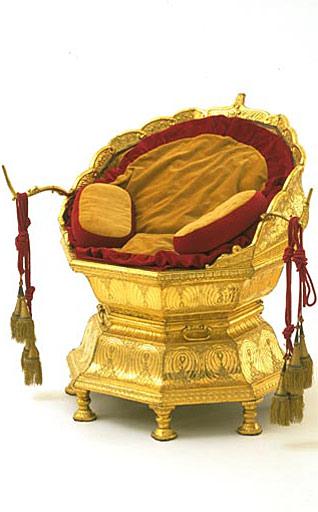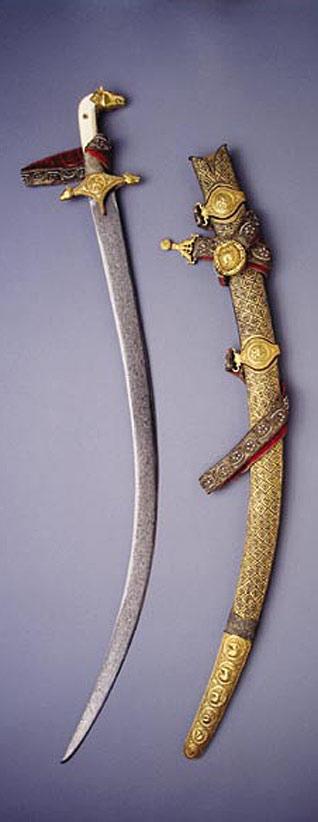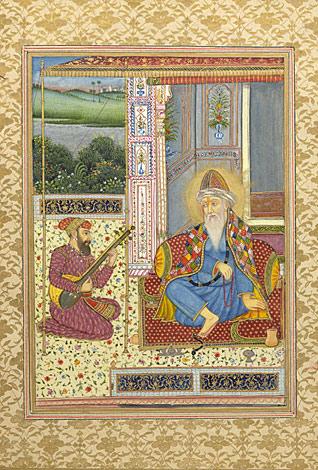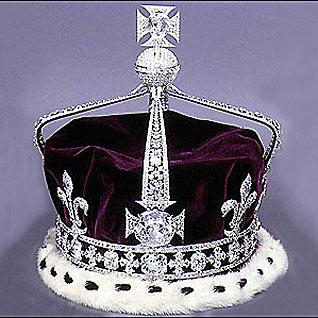Art
Stolen Treasures
by I.J. SINGH
Let us start with a given.
There is absolutely no question and little doubt that in the Indian Army attack on the Golden Temple in 1984, much priceless art and artifacts were destroyed. There is also incontrovertible evidence that truckloads of rare manuscripts and relics were carted away by the army.
Now, over twenty years later, there have been sporadic demands by Sikhs that those relics be returned; there has been no response to date. This unresolved matter prompted me to cast a wider look at the art world - how art is acquired and how it ends up where it does.
Perhaps the most outstanding claim remains over the fate of the Elgin Marbles. In the War of Victory against the Persians, Athens was destroyed. Pericles led the campaign to rebuild it. The Parthenon was constructed between 447 and 432 BC, and dedicated to the Greek goddess Athena; hence the name Parthenon Marbles. In 450 AD, the Parthenon was turned into a church; a thousand years later, in 1458 AD, the Turks converted it into a mosque.
Lord Elgin was the British ambassador to the Ottoman Empire in 1801 and an inveterate art collector. The potentates of Constantinople were happy to "sell" him the art work of the Parthenon. Lord Elgin dismantled about 274 feet of the original 524 feet and carted away about 120 tons of it. Now known as the Elgin Marbles, the art has a home in Britain, and has been restored - some say, ineptly.
Now two hundred years later, the Greeks want it back. The art, they say, belongs to the people of Greece; it was looted by the Turks and illegally sold to Lord Elgin.
This is hardly the only story of stolen art, even if it is the most dramatic.
During the Second World War, Germany plundered 427 specimens of rare art from Soviet museums and collections. In the aftermath of the war, the National Gallery of Art in Washington, D.C., acquired 202 of those pieces. Frances Taylor, then the director of the Metropolitan Museum of Art in New York City, claimed that "in this war, the American people have earned the right to such compensation as they choose to take it". Luckily, other officials demurred and called such appropriation "morally untenable". President Truman agreed, and the material was subsequently returned.
But few cases end so simply or happily.
Peru wants the relics from the 500-year-old Incan city, Machu Picchu, returned from Yale University, which now houses them. There is no question that they are well protected and preserved at Yale, and that it was an American, Hiram Bingham III, who made the hidden city known to the outside world. The case for getting them back rests on the claim that the rightful owners of the relics are the Peruvians. They dispute that these artifacts are best preserved and studied at Yale, away from the culture of their origin.
Readers could not have missed the ongoing attempts to locate and return art that was stolen from the Jews during the Second World War. Recovery and restitution are not easy matters, and the process remains unfinished.
Western powers have used a variety of sophistry to justify their plundering of vulnerable civilizations. One only needs to look at the great Western museums and the endless collections of private art connoisseurs to realize the extent of their power in their heyday, and how ruthlessly they used it.
Private collectors especially, and even museums, have often behaved as robber-barons in their quest for relics from across the world. But it is now a politically correct world, and one counter-argument clearly says that if you didn't pay for what you took, then you stole it.
Similar arguments prevail in the case of lost and stolen Sikh art. The Indian government removed plenty in 1984 from the toshakhana (treasury) and the Central Reference Library collections of the Golden Temple, and returned none of it. The irony is that none of the art has so far surfaced in any national gallery, academic or private collection. So, wherever it is now stored, it serves no purpose.
Could it be that some of it has entered private collections of the political honchos or the generals of the day? The pity is that there is no accounting of it. True to the lackadaisical modus operandi in the Indian culture, no exhaustive listing of the missing artifacts exist; perhaps none was completed either by the custodians of the art when they had their opportunity, or by the army that stole it.
Like most empires of the day, the British Empire, too, was notably rapacious. The very impressive collections of Indian art in British holdings do not surprise us. We remember collectors of Sikh art like Lockland Kipling and Lord Dalhousie. When the British annexed Punjab, they did what they have done in much of the world that they ruled; they carted away art, relics, and many of the finer things of life. Consequently, British museums have benefited from shiploads of Sikh and Punjabi art.
Countless hand-made phulkaris, shawls, paintings and examples of folk-art enrich British castles. The aigrette (kalgi) that reputedly adorned Guru Gobind Singh's turban is now housed in the British Museum, along with many of his personal weapons. Also found there is what may be the handwritten version of the Damdami Birh - the definitive rescension of the Guru Granth. A painting of Guru Tegh Bahadur, said to be made during his lifetime was, for many years, in a museum in Bangladesh. And then, there is the Kohinoor itself ...
Now, many Sikhs worldwide are clamoring to have them returned to Punjab. Is it best that art remain close to or embedded in the culture of its origin? Not that I have any answers, but I do want to open that topic for exploration.
Within the past decade, I have heard that rare manuscripts of early Sikh period have been lost or misplaced from academic libraries in India. I also know that many historical documents like the Kartarpur rescension of the Adi Granth, the precursor of the Guru Granth, are the personal properties of certain families. That makes them not so easily available to scholars. This also means that they are not so well preserved.
And don't forget the treasures that the Indian government and its army confiscated and misappropriated in 1984. How well preserved, protected or available are they now? Some credible observers of the Indian scene indicate that a number of the stolen artifacts have indeed surfaced in the marketplace, and that some illustrated manuscripts, e.g., pothis and janamsakhis are being sold surreptitiously, page by page, at horrendous prices. I would not be surprised if some of that lode is on the market, albeit under the table; some might already have been spirited out of the country.
I understand full well that Sikh relics belong to the Sikh people, and not to any government or political institution. The Sikhs now have an international presence; their religion and its artifacts speak of universal values in ways that have eternal meaning.
Better yet, these markers of Sikh religion, culture and history are treasures of mankind. Art and artifacts best serve their purpose when they are freely available to people worldwide, to Sikhs and non-Sikhs alike, and where governments and foundations protect and preserve them for posterity.
Even beyond the constraints and consideration of preservation and safe-guarding, wouldn't a small Sikh museum, perhaps in Punjab, only limit and imprison them to a cultural/geographical enclave, when they really need and deserve the free marketplace of people from around the globe?
Could it be that trying to limit them into our tight little fist would only diminish us into a small toad with a constricting presence in a well of our own making?
[All images are of Sikh historical objects currently in British hands - Photos: Courtesy, Anglo-Sikh Heritage Trail. Top of this page - the legendary golden throne of Maharajah Ranjit Singh. Bottom of the page - part of the Kohinoor diamond, now ensconced in the Crown of the Queen Mother. Second from bottom - Illustration from a manuscript, depicting Guru Nanak and Mardana. Third from bottom - the sword of Ranjit Singh. Thumbnail - illustration depicting Guru Nanak, Mardana and Bala, from the Gutka of Rani Jind Kaur (Jindan). Home Page - a cannon belonging to Ranjit Singh's army.]
Conversation about this article
1: Suaran Singh (Penang, Malaysia), July 18, 2007, 12:07 AM.
The army that stole the materials must return them forthwith (?) - 23 years have now gone by! With a Sikh Prime Minister at India's helm today, it is absurd and surrealistic that nothing has been done yet in this regard.
2: Dalabar Singh (Ba, Fiji), July 18, 2007, 5:07 PM.
I very strongly feel and support the return of our treasures to a central Sikh Museum. They are the symbols and artifacts of our faith, heritage and culture.
3: Jasmine (U.S.A.), July 18, 2007, 6:09 PM.
The artifacts STOLEN and not merely taken away after burning the historical Sikh Refernce Library, have been previously demanded. A lot has been written about them by many writers, Sikh activists and politicans to the Indian government, but to no avail! I would urge the Sikh media and institutions in North America and all over the world to come together to pressurize the authorities to correct this grievious wrong.
4: Meharpal Singh (Sydney, Australia), July 18, 2007, 8:16 PM.
My kind of article. Stolen loot, and others claim it is theirs. Be it the Koh-i-Noor, for God's sake, bring all the loot back to those who owned it in the first place. Realizing that truth is the only answer, Guru Nanak taught us this. We Sikhs should also demand our honest and rightful claim to whatever was taken from us illegally and without our consent.
5: Jagdeep Singh (London, U.K.), July 18, 2007, 9:37 PM.
The Koh-i-Noor diamond belonged to many looters and avaricious men before it fell into the hands of Ranjit Singh as plunder of war and treaty.
6: Mandeep Singh (Ludhiana, India), July 19, 2007, 4:52 AM.
It's one more area in which we have suffered a huge loss as a community. Its high time that we put our heads together and demand the stolen items back from the Indians. Now.
7: Prabjot Singh Kalsi (New Delhi, India), July 19, 2007, 5:29 AM.
I belong to Amritsar and was of five years of age when the Indian army attacked the Durbar Sahib. We should be pursuing the issue of the stolen treasures via the Right to Information Act of the Government of India.
8: Amandeep Singh Madra (London, U.K.), July 19, 2007, 9:50 AM.
I agree with the sentiment in the article and some of the comments. As I.J. Singh rightly points out, it should be noted that Sikhs themselves have not been quite so benevolent in the preservation and consevation of their own heritage; for 17 years after Operation Bluestar, Sikhs continued to cremate handwritten Birs in Kiratpur every Tuesday. In the 1960, Sant Fateh Singh had many thousands of handwritten manuscripts from the Central Sikh Refernce Library cremated (including writings of the Gurus themselves). Now, 23 years since Bluestar, nothing has been done to digitize and preserve the remaining Sikh manuscritps either in the Amritsar collection or across India. A similar list of transgressions could be made of Sikh buildings, arms & armour, paintings, wall paintings, etc. This is an area where we (as a community) have some leverage and I would urge readers to press bodies such as the S.G.P.C. to commence and pursue such a programme.
9: Harpreet Singh (India), July 19, 2007, 10:06 AM.
India's Prime Minister is a Sikh. We should put public pressure on him to address this problem immediately.
10: Rajat Singh Sidhu (Brampton, Ontario, Canada), July 19, 2007, 1:52 PM.
Let's all promise to raise the issue in our local Gurdwaras, before the sangat. The next step should be to coordinate a joint, worldwide line of action.
11: Birjitender singh (U.S.A.), July 19, 2007, 2:04 PM.
Wow! What a marvelous job done by the Indian government and army! Can we call it our country? If it is, then who is looting us? Is there anybody in the Indian government who can understand what's wrong with what they've done? I would hesitate to call India my country. Without any doubt and without any question, they should return all the items to the Darbar Sahib. Shame on the Indian goverment!
12: Virenderjit Singh (India), July 19, 2007, 5:35 PM.
We Sikhs should be ashamed of ourselves. Our leaders ae busy filling their coffers - or maligning their opponents - and wouldn't bat an eyelid to do something meaningful for the community. And yet, we go and vote for them! The Prime Minister has no say. The Chief Minister of Punjab, along with his cronies, is busy amassing wealth beyond his borders. The so-called learned and the distinguished members of the community are busy griping amongst themselves. The panthic leaders are but puppets of the politicians, forever busy with trying to hold on to their seats. The ordinary, common Sikh is too busy making a living. So, who is going to demand our records and manuscripts and artifacts back...? We need to form a group which has the complete backing and mandate of the community and political leaders, to put forth our case to the Government. This group should have the full and whole-hearted support from all segments of the Sikh community, in order to achieve the goals. Please, for once, let's start working for the sake of the collective good, and leave a worthwhile legacy for the generations to come! Gur Fateh.
13: Sarib Singh Khalsa (Eugene, U.S.A.), July 19, 2007, 9:09 PM.
Lets all work together within our communities to educate each other about the priceless value of these parts of our heritage. If we all cared and understood what is going on even today, we would make a difference. The SGPC's budget for architectural heritage preservation and restoration is Rs. 0. Yes, zero! What does that say about us? A people with no history has no future. Let us make a change.
14: Inderpreet (United States), July 19, 2007, 10:05 PM.
As a Sikh-American, I think historical Punjabi/Sikh artifacts are better kept in museums outside of India, and not returned to that country. Past experience dictates that that Indian gov't and its politicians will probably try to distort Sikh history and identity by selectively displaying certain items while obscuring the rest. Better to have an unbiased proprietor, like the British.
15: D.J. Singh (U.S.A.), July 19, 2007, 10:36 PM.
Where should Sikh art and historical objects be displayed? In Punjab, Amritsar, Golden Temple, the new Anandpur Sahib Museum, or other countries where Sikhs also reside. We all value these treasures. They are a source of inspiration to us. They are part of our culture and history. The international Sikh community must make every effort to help preserve these relics at the Golden Temple.
16: Gursean Singh (U.S.A.), July 19, 2007, 10:48 PM.
We will get our old texts back when the government is finished editing and rewriting our history to their liking. They are trying to make sure we do not take anymore inspiration to rise up against them. But there is one thing they can never change: Gurbani! And, we will continue to draw inspiration from that.
17: Gurvinder Sahni (India), July 20, 2007, 2:09 AM.
I think the S.G.P.C. has failed to make the necessary demands because its leaders are too busy politicking. Pity, that with a Sikh as Prime Minister in New Delhi, and the Akalis in power in Chandigarh/Punjab, we still haven't achieved this. Maybe the Delhi crowd (D.G.P.C.) should get involved ... they've always done a better job, relatively.
18: Tavinder Singh (Kenya), July 20, 2007, 4:14 AM.
I do get a bit mysified at times, looking at all the current goings-on in Punjab, such as the Dera character getting VVIP status, for example. The S.G.P.C. and other Sikh bodies should organize a peaceful procession of the masses to the Prime Minister's residence and put pressure on him and his government to act. As for Sikhs in the diaspora, we should create media awareness on the issue of the stolen treasures, and join our brethren hand in hand in India to get a response from the Prime Minister. We should strive to solve the problem; 23 years is a long time!
19: Pardeep Singh (India), July 20, 2007, 11:10 AM.
Recently, through the Dera incident, we've learnt that there is no support from the government for the Sikhs. In fact, the contrary. Please be careful when you talk about our treasures being returned to India, and first think out its implications and ramifications. There is a shallowness about everything in India today ... everyone wants to be jazzy, but no one is willing to be a Baba Deep Singh. Some serious and hard work lies ahead for Sikhs everywhere, especially those of you who are living outside India ... let's get to it!
20: Sonia Grewal (Sweden), July 20, 2007, 5:28 PM.
I totally agree that our treasures are far safer outside India!
21: R. Sandhu (Brampton, Canada), July 20, 2007, 7:44 PM.
I think it is rather heartening to know that our heritage survives, wherever it may be. Our homes are all over the globe, then do we really need to to fall out of the frying pan into the fire, by suggesting SGPC or its sponsors or the Indian government take care of them? To date, the job they have done in destroying our heritage is more notable than any preservation efforts whatsoever. India does not inspire too much trust, when we have yet to recover what they looted in 1984. We need a better solution: perhaps a museum, under the auspices of a world Sikh body, somewhere in the diaspora ... but outside India.
22: Amandeep Singh (Melbourne, Australia), July 20, 2007, 11:42 PM.
I am ashamed that we are requesting the Indian Brahminical Government to give us our belongings back, knowing full well their intentions and motivations. We know from history that this is not the way to win your rights from them. If we are united and strong ... as the Khalsa should always be ... we can find an efficient and honourable way of achieving our goals and getting them to behave properly. Gur Fateh.
23: G.B.S.Nijjar (Manteca, California, U.S.A.), July 21, 2007, 7:20 PM.
Very astonishing facts regarding stolen artifacts from Darbar Sahib ... and that retrieval is nowhere in sight, despite the fact that we have a couple of Sikhs currently holding key positions. What good has that done us?
24: Jagminder Singh (India), August 10, 2007, 9:14 AM.
We Sikhs should be ashamed of ourselves. Our leaders ae busy filling their coffers - or maligning their opponents - and wouldn't bat an eyelid to do something meaningful for the community. And yet, we go and vote for them! The Prime Minister has no say. The Chief Minister of Punjab, along with his cronies, is busy amassing wealth beyond his borders. The so-called learned and the distinguished members of the community are busy griping amongst themselves. The panthic leaders are but puppets of the politicians, forever busy with trying to hold on to their seats. The ordinary, common Sikh is too busy making a living. So, who is going to demand our records and manuscripts and artifacts back...? We need to form a group which has the complete backing and mandate of the community and political leaders, to put forth our case to the Government. This group should have the full and whole-hearted support from all segments of the Sikh community, in order to achieve the goals. Please, for once, let's start working for the sake of the collective good, and leave a worthwhile legacy for the generations to come! Gur Fateh.
25: Jasleen Kaur (U.S.A.), February 01, 2008, 1:55 PM.
Perhaps Sikhs should be looking to outside human rights organizations to assist in the return of our artifacts. After WWII, several international organizations helped Jews in recovering their possessions which had been stolen by the Nazis ... Is our case really so different? Obviously the Indian government is not interested in helping us; what if we went to outside groups for help? Most people outside of the Sikh community don't even know about what happened in 1984. Isn't it time the world heard?






